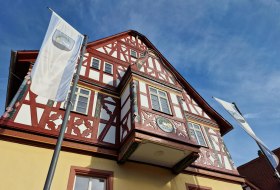
searchMenu


In the cross vault of the Engelthal Monastery fine seasonal dishes are offered. Matching every dish there are in-house wines. General information on this typical kind of Rheinhessen vault, called "Kuhkapelle" (cow chapel) The origin of the typical Rheinhessen vaults goes back to the early 19th century. At that time, farmers wanted to increase the yield of their cattle by keeping them in stables and use the leftovers as fertiliser for their fields. Initially, the cattle were housed on the ground floor of the half-timbered houses, above…

The cross vault cellar of the Bernhard Grünewald family is used as a rustic tavern in the winter months from november to february. General information about Rheinhessen cow chapels The origin of the typical Rheinhessen vaults goes back to the early 19th century. At that time, farmers wanted to increase the yield of their cattle by keeping them in stables and use the leftovers as fertiliser for their fields. Initially, the cattle were housed on the ground floor of the half-timbered houses, above which hay and straw were stored.…

Multimedia offer guides you through the imperial palace of Ingelheim! The Kaiserpfalz App is available free of charge at Google Play and in the AppStore (to be found under the keyword "Kaiserpfalz Ingelheim"). The app supplements the signage and accompanying booklet with a digital guide through the Kaiserpfalz region, which provides audio texts and picture galleries, among other things. Thus, the Kaiserpfalz can be experienced digitally at any place and at any time.

Erected around 1832 as a reminder of the construction of the "Ingelheimer Grundstrasse" between Nieder-Ingelheim and Nieder-Olm 1829-1832, which crossed here with the Mainz-Bad-Kreuznach highway via Sprendlingen, west of the town center of Stadecken. Source: Cultural monuments Rld.-Palatinate

The sculpture "The Cloud" (1968/69 bronze) by Eberhard Linke here at the starting point of the Hiwweltour Aulheimer Tal is a reference to the sculpture collection of the Eberhard und Barbara Linke Foundation, which can be visited from May to October, Saturdays 2 to 6 pm - admission free. Three minutes on foot, Erbes-Büdesheimer Straße 7

The town hall in Bodenheim is a typical example of the Franconian-Hessian half-timbered construction style of the Renaissance around 1600 and is considered one of the most beautiful half-timbered houses in Rheinhessen. The renovation was completed in 2023; it now shines in new splendour in the old town centre of the wine-growing community of Bodenheim. It was built in 1608 under the then lord of the village, Provost Anton Walpot von Bassenheim, as a new courthouse for the Mainz Knights' Abbey of St Alban. In the bay window, we recognise the…

The water tower built in 1906 on the Höllberg near Wöllstein is considered a landmark of the place. The listed tower was restored in 2025. It is a popular meeting point and picnic area and is located on the Küstenweg Rheinhessen hiking trail.

The baptismal church of Hildegard of Bingen in Bermersheim v.d.H. has been used repeatedly since the Reformation and finally to the present day as a Simultankirche - a church used separately by both denominations. This is a Franken characteristic and it stands under the patron of Saint Martinus.